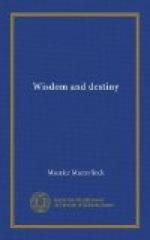34. So much for isolated wisdom; now let us return to the wisdom that moves to the grave in the midst of the mighty crowd of human destinies; for the destiny of the sage holds not aloof from that of the wicked and frivolous. All destinies are for ever commingling; and the adventure is rare in whose web the hempen thread blends not with the golden. There are misfortunes more gradual, less frightful of aspect, than those that befell Oedipus and the prince of Elsinore; misfortunes that quail not beneath the gaze of truth or justice or love. Those who speak of the profit of wisdom are never so wise as when they freely admit, without pride or heart-burning, that wisdom grants scarcely a boon to her faithful that the foolish or wicked would prize. And indeed, it may often take place that the sage, as he moves among men, shall pass almost unnoticed, shall affect them but slightly; be this that his stay is too brief, that he comes too late, that he misses true contact; or perchance that he has to contend with forces too overwhelming, amassed by myriad men from time immemorial. No miracles can he perform on material things; he can save only that which life’s ordinary laws still allow to be saved; and himself, it may be, shall be suddenly seized in a great inexorable whirlwind. But, though he perish therein, still does he escape the fate that is common to most; for at least he will die without having been forced—for weeks, or it may be for years, before the catastrophe—to be the helpless, despairing witness of the ruin of his soul. And to save some one—if we admit that in life there are truly two lives—does not of necessity mean that we save him from death and disaster; but indeed that we render him happier, inasmuch as we try to improve him. Moral salvation is the greatest salvation; and yet, what a trifle this seems, as everything seems that is done on the loftiest summits of soul. Was the penitent thief not saved; and that not alone in the Christian sense of the word, but in its fullest, most perfect meaning? Still had he to die, and at that very hour; but he died eternally happy; because at the very last moment he too had been loved, and a Being of infinite wisdom had declared that his soul had not been without value; that his soul, too, had been good, and had not passed through the world unperceived of all men.
35. As we go deeper down into life we discover the secret of more and more sorrow and helplessness. We see that many souls round us lead idle and foolish lives, because they believe they are useless, unnoticed by all, unloved, and convinced they have nothing within them that is worthy of love. But to the sage the hour must come when every soul that exists claims his glance, his approval, his love—if only because it possesses the mysterious gift of existence. The hour must come when he sees that falsehood and weakness and vice are but on the surface; when his eye shall pierce through, and discover the strength,




